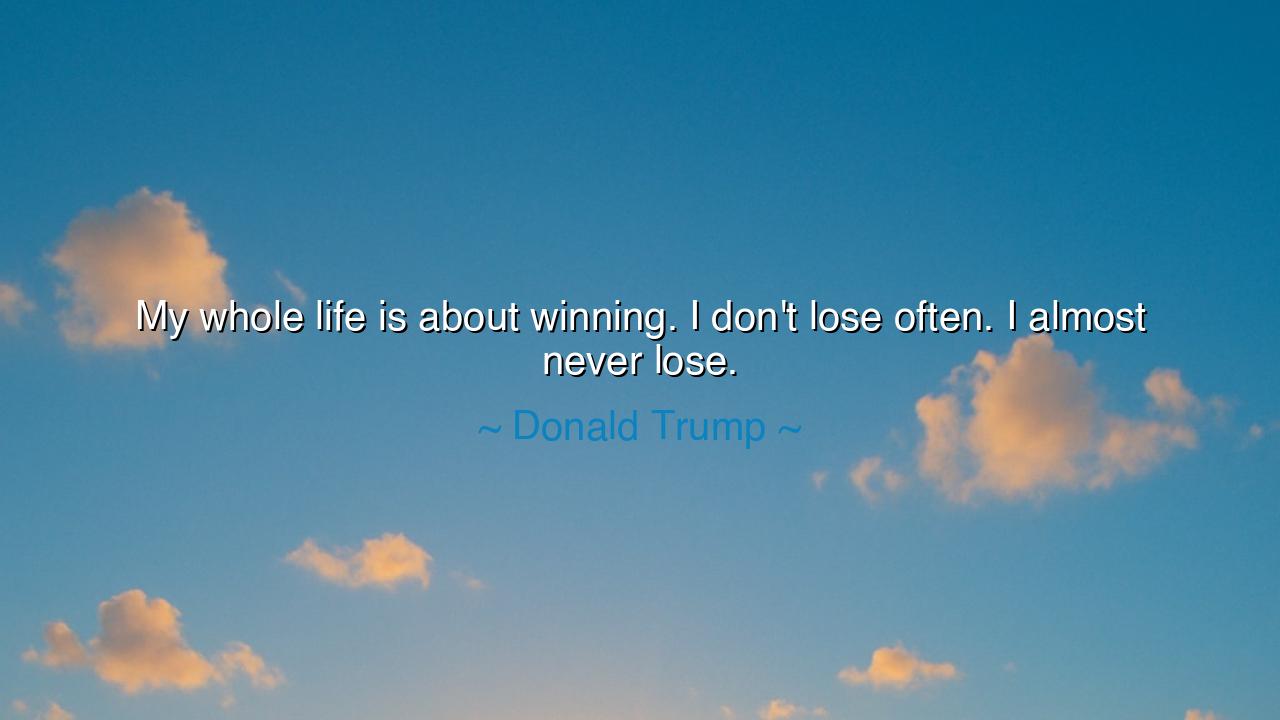
My whole life is about winning. I don't lose often. I almost






“My whole life is about winning. I don't lose often. I almost never lose.” Thus declared Donald Trump, with the boldness of one who has built his identity upon conquest and triumph. In these words lies a vision of life as a contest, where the measure of a man is taken in his victories, and where defeat is not merely an event but an enemy to be denied. It is the voice of ambition sharpened to a blade, of confidence that does not bend, of a spirit that seeks to define itself through unbroken winning.
The ancients, too, honored the pursuit of victory. The Greeks raised monuments to Olympians whose strength and speed brought glory not only to themselves but to their city-states. The Romans adored their generals, granting them triumphal processions when their victories expanded the empire’s borders. To win was not merely to achieve, but to embody honor, power, and divine favor. Trump’s words, though modern, echo this ancient hunger: the desire to live as one who conquers, who does not yield, who rises again and again until all opposition crumbles.
Yet history also offers a caution. Alexander the Great, whose life was woven entirely of victories, seemed invincible. He conquered nations until the world lay before him, yet his empire fractured after his death. His life, though filled with triumph, reminds us that endless winning does not always ensure lasting legacy. The lesson is subtle but clear: winning is mighty, but wisdom must walk beside it. Without balance, victory can consume the victor.
Trump’s declaration also reveals the psychology of perseverance. To say “I almost never lose” is not to claim literal perfection, but to embody a mindset—one that refuses to dwell on failure. Many leaders, athletes, and inventors throughout history have shared this spirit. Thomas Edison, after thousands of failed experiments, declared that each attempt was not a loss, but a step toward success. In the eyes of such men, losing scarcely exists, for even in defeat they name themselves victorious by persistence.
O children of the future, take this teaching to heart: the way you frame your life determines the power of your journey. If you see yourself always defeated, you will crumble. If you see yourself always rising, always striving, always “winning” in spirit, you will endure storms that would destroy others. This is not arrogance alone; it is the weapon of unshakable confidence, a shield against despair.
The lesson is this: cultivate the mindset of victory, but temper it with humility. Believe in your ability to win, but remember that even losses can be teachers. Winning is not always conquest over others—it may be mastery of the self, the overcoming of fear, the persistence to endure. If you carry this spirit, you will “almost never lose,” for even in stumbling, you will find a way forward.
Therefore, let your practice be this: pursue your goals with unrelenting confidence. Face failure, but do not dwell in it. Speak of victory, live as though triumph is your birthright, and let this belief fuel your labor. But also remember the wisdom of the ancients: respect your opponents, honor your struggles, and know that the truest winning is not only what you gain, but what you become.
So I say unto you: take from Trump’s words both the fire and the warning. Live with the certainty of a victor, and let it drive you to heights unknown. But do not let the hunger for victory blind you to wisdom, compassion, and truth. For in the end, the greatest life is not only one of endless winning, but one where the victories leave behind a legacy of strength, honor, and enduring meaning.






AAdministratorAdministrator
Welcome, honored guests. Please leave a comment, we will respond soon